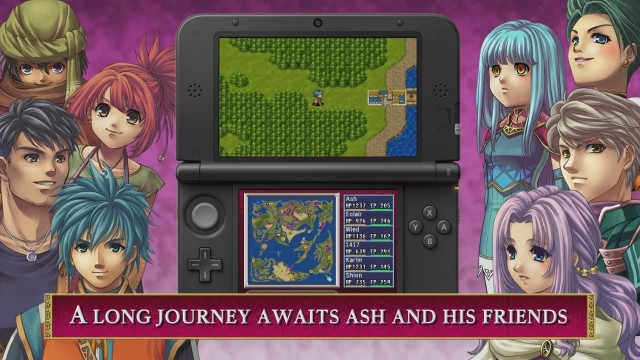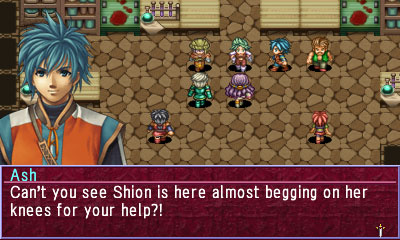Retro look and feel; Energi system; decent soundtrack
Middling presentation; doesn't do anything special; will be a major grind for players who don't appreciate old-school RPGs
For some players, game developer Kemco is synonymous with the title Batman: Dark Tomorrow, an infamous GameCube stinker that attempted to merge the intense action of the Dark Knight with the tank controls of Capcom’s PlayStation-era Resident Evil games. Thankfully, Kemco is quite a bit removed from the blunder that was Dark Tomorrow, and in more recent times has carved itself a niche as one of the few game studios producing old-school JRPGs on a regular basis. Though its efforts tend to be confined to mobile platforms like the App Store, fans who are interested in playing the sort of RPGs that once graced SNES on a regular basis might be interested in Alphadia, the company’s latest offering on the 3DS eShop.
Alphadia is a traditional JRPG to its core. A fantasy setting, perky, teen heroes, a quest to stave off the forces of an evil, vaguely-European-sounding evil empire; it’s all there for fans of the subgenre. In fairness, that sounds a tad more biting than I mean it to, but before anyone jumps into Alphadia, it has to be stated upfront that this is probably a game the likes of which that many folks have played before, and likely will have mixed feelings about returning to. There are no complicated skill trees and combat systems to learn, nor is leveling anything more obtuse than stacking experience points from battles and watching the team’s stats soar upwards. For those weened on today’s RPGs, or players who simply have lost their love for the more stripped down games of the genre’s earlier years, Alphadia will likely land with a thud, as it’s intentionally rooted in the traditions of the past.

For those who would like to play something with some of the flair of the RPGs that existed around the time of Final Fantasy IV (or thereabouts), Alphadia is a good time to be had. Good, but not great. Spiky hair and pixelated environments abound, and they look fairly nice but are by no means innovative. Some games go a little overboard aping the rough edges of titles from the 8 and 16-bit eras, and Alphadia is guilty of that to a certain degree. I would have liked to see Ash, Karim, and the rest of the cast (not to mention the game world) try to do something new with all this old window dressing, but as it stands Kemco played things too safe for Alphadia to be anything special. The presentation gets the job done and nothing more. I was left not feeling especially drawn to Alphadia and its cast or world as a result, but I didn’t dislike any of what I saw, either, so… cheers?
The battle system is similarly retro, with basic turn-based, menu-driven action. I rather enjoy this style of RPG combat, so I was fine tapping away at the same commands over and over, grinding for exp in random battles and so forth, but again, how much mileage the average player will be able to derive from this setup depends on personal preference more than anything else. There is a caveat in the form of Alphadia’s Energi system, which assigns elemental qualities to characters and attacks, with a rock-paper-scissors style of strengths and weaknesses to keep track of. It isn’t especially deep, but it’s easy to learn and adds an additional layer to what are otherwise very standard enemy engagements. Kemco arguably could have tried to be a little more ambitious with the use of Energi, but given the retro, simple nature of this game, it’s understandable why the development team didn’t.

Returning to the presentation for just a moment, I would like to say that though Kemco made pains to replicate the look and feel of SNES and Genesis-era RPGs, there’s a shakiness to the animations and jerkiness to player movement that never felt quite right to me. Frankly, Kemco’s focus on mobile titles seemed to be poking through the seams as I played Alphadia; the overall middling quality of the visuals and controls felt like something I’d come across in an Android or iOS game, and it just isn’t acceptable on a dedicated gaming platform like 3DS. The music was fitting, at least, and didn’t diminish the experience, but I walked away from Alphadia feeling like the game wasn’t specifically made for Nintendo’s handheld, but rather was shoehorned onto the system, instead. I will give a nod to the localization team, though; this is easily some of the best dialogue I’ve yet seen from a Kemco release. It could flow a bit better in some places, but otherwise it’s nice to see effort put into such a crucial element of the game.
If I don’t seem especially pumped about Alphadia, it’s because I’m not. It’s a competent game that sets out to feel like something old, and though it arguably succeeds, it doesn’t do anything special in the process. The art direction and music are appropriate for the tone that Kemco was looking to create, but the execution falls short of the quality of a 3DS game, with some shaky mobile hitches on display throughout. The battle system, though very traditional, is fun, thanks in part to the addition of the easy to learn Energi system. Alphadia isn’t in the same league as a game like Chrono Trigger, but it gets the job done and will scratch the old-school RPG itch in a way that some players will enjoy. For anyone else, it’s likely that Alphadia will feel too archaic and rough to maintain their interest for the duration of the game.
Nintendojo was provided a copy of this game for review by a third party, though that does not affect our recommendation. For every review, Nintendojo uses a standard criteria.




 ShareThis
ShareThis





